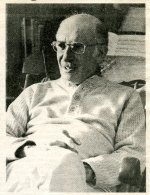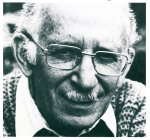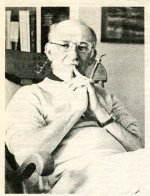
Most of his books that I own are first editions, sent to me by the publisher several weeks before the publication date. How agreeable to have such gifts arrive so early so as to read them before other people could. The problem, however, was that an intense Bern was anxious to get as soon as possible the opinions and reactions of the selected readers he had designated for early copies - the more detailed the better. These favored friends were on their own since they could consult no reviews, which didn't appear until after publication. Bern furthermore, could and would recognize an evasive generalization. I realized that I had to be resourceful and truthful. With trepidation, I managed to have my opinions in the mail early, even my unfavorable opinion of Dubin's Lives. I forget when or where, but he did comment publicly that I had criticized his books fairly. That was a relief for me.
And there were complications about correspondence. On a weekday afternoon - not his usual calling time - he phoned from New York. I could tell immediately from his voice that he was tense. We started the conversation with who was doing what until he said he had a question for me. "What do you do with my letters?" I answered, "I have them in my desk in a pile with an elastic band around them." His next question was, "Do you know anybody else in Corvallis who has kept my letters." I did not. Then came the explanation: He had heard that somebody had bought a collection of his letters from a San Francisco bookstore. Not knowing whose letters these were upset him, even though the receiver of letters legally owns them. Several weeks later he found out that a woman from Eugene had sold the letters after her husband - a friend of Bern's who had taught creative writing at the University of Oregon - had recently died. Situation back to normal.

Credit: The Oregon Stater, 1986.
"Bernard Malamud, award winning author." OSU Oregon Stater. April 1986.
Deciding that I would never want to be known for having capitalized from his correspondence, I went through it to separate the letters and cards into two piles: those that had any reference to his writings and pertinent observations or opinions and second, those that were bits of administration, arrangements for meeting, sick reports, domesticity, etc. The "penny" post cards he mostly used for the latter. I destroyed the second pile and gave the first to the OSU library, where with other Malamud material they are filed and available. When I told by phone what I had done, Ann's voice intimated that Bern would have preferred all to be saved.
A few years ago, a large collection of correspondence to Bern was deposited in the Library of Congress in Washington, DC. Upon hearing of this event, I batted my eyelids a couple of times from the realization that the collection probably included a number of my letters. When I write to friends, I rarely try to overcome my atrocious spelling. So what of mine slumbers in that august library? If any scholar should quote me, will he out of kindness adjust my spelling peculiarities?
In June 1985 our younger son Ben drove us through New England. We stopped to visit the Malamuds in Bennington, Vermont. Bern had pills for a variety of ailments and moved cautiously. But he was intellectually alert and able to walk us to a nearby cemetery where we unexpectedly were shown the grave of Robert Frost.
When Bern and I hugged goodbye, I assumed I would never see him again. Unfortunately, I was right. He had retired from teaching but was still writing with difficulty. In the summer they lived in their Vermont home and in the winter in their New York apartment. There he had a stroke and died. Ann, who had been out for a luncheon engagement, found him on the floor. Bern had departed along with our instinctive friendship, but a collection of his twelve published books is not merely a reminder of him but the epitome of his life's endeavor.
All recognized writers go through a period often referred to as a trough; they drop out of attention, and the enthusiasm for their writings wanes. Both Fitzgerald and Hemmingway did until they were rediscovered in the 1950s. Melville of Moby Dick fame went into obscurity in the 1890s until a miraculous recovery in the 1920s. For many years Bern was usually evaluated among the ten best American fiction writers - sometimes among the best five.
I believe attention to Bern's works had flagged while his two Jewish American competitors, Saul Bellow and Philip Roth, write on. Whether he is in the trough, I do not know, and - if so - whether he will emerge is, as always, impossible to predict. Should he, I suspect that the Jewishness of his writing style, thinking, and storytelling would be the responsible element for his endurance and even make his short stories the most read of his writing. For the first time his Collected Short Stories was published recently in 1997.

Credit: CLA Alum magazine, 1985.
"A New Life: A Controversial Novel Is 25 Years Old." Ron Lovell. OSU CLAALUM, v.2 n.1(1-3). December 1985.


